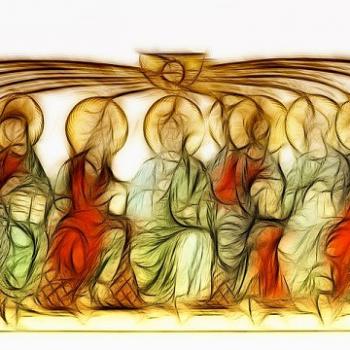With the death of Supreme Court Justice Ruth Bader Ginzberg, the abortion issue is slowly percolating to the top of an “important issues” list already so full that it is impossible to keep proper track of all of the items on the list. If President Trump, Mitch McConnell, and the Republicans get away with ramming a conservative justice through nomination and confirmation, will the landmark decision Roe v. Wade be overturned? White evangelical Christians, who support Trump in numbers exceeding 80%, often point to the abortion issue and court-stacking as two of the most important reasons they continue to support the least-Christian president in history. What happens when one important issue becomes so important in a person’s mind that it entirely obliterates equally important issues?
A few days ago, the Washington Post published an op-ed by Michael Gerson entitled “Abortion isn’t the only issue on the presidential ballot,” which Gerson, who is a conservative evangelical Christian and strongly pro-life, begins by noting that until recently, he would have denied that he could ever vote for a pro-choice presidential candidate. Until now, that is. Gerson, George W. Bush’s primary speechwriter from 2000-2006, explains that “being pro-life does not grant general permission for dangerous ineptitude.”
Michael Gerson: “Abortion isn’t the only issue on the presidential ballot”
Throughout the op-ed, Gerson warns of the danger of being a “one issue” voter, voting as if, in this case, abortion is such an important moral issue that no other issues matter. But they do, especially now. Gerson writes that
If other issues are allowed to matter, the floodgates open.
- It matters that Trump engages in bold, systematic and daily deception, to the point of inhabiting a separate, conspiratorial universe of self-serving lies.
- It matters that Trump has stoked White, suburban fears of dark-skinned invasion and augmented the legitimacy and morale of white supremacy on the political right.
- It matters that Trump has been a cheerleader for cruelty against migrants and their children and has refused to see a common humanity beneath national differences.
- It matters that Trump’s administration is shot through with corruption and self-dealing.
- It matters that Trump sees blue states as part of a foreign and hostile country and seems incapable of serving citizens who don’t show him undivided adoration.
- It matters that Trump seems inspired by authoritarians and sullies democratic norms like so much Kleenex.
- And it should matter — greatly — to pro-life people that Trump has presided over a substantially preventable public health disaster, causing tens of thousands of unnecessary deaths, largely among the ill and elderly.
Gerson ends his op-ed by writing that “It dishonors the pro-life cause to make it an inexhaustible permission slip for prejudice, deception and malice. And so, I find myself in an uncomfortable but inevitable position: I am pro-life, and I intend to vote for Joe Biden.”
Last February, I wrote about precisely this phenomenon—turning one important moral issue into the only moral issue—and how it can blind one to the importance of any number of equally important matters. As we grind through the final weeks of the current presidential season, it strikes me as important to revisit that February essay. I invite your comments and reactions.
Idolatry and Abortion
I say “Idolatry” and you think about . . . what? Worshiping golden calves? Elijah and the priests of Baal? Early Christian leaders debating whether it is okay to eat food that has been dedicated to idols? “Idolatry” is one of those words that largely has been co-opted by various religious systems, a word reserved for the worst of badly directed worship, worship focused so wrongly that—according to the ancient texts, at least—it is likely to draw the negative attention and even wrath of what the idol is replacing.

There is a reason that the second of the Ten Commandments is a prohibition against idolatry, a reason that has relevance far beyond religious frameworks. We human beings are incurable idolaters, more than happy to pattern ourselves after someone or something else rather than to take on responsibility for ourselves. Anything can be an idol—a person, an idea, a group, whatever is raised to such importance that all other matters, including even basic moral guidelines and principles, fade into the background.
Last spring, I studied the work of Simone Weil, a fascinating and important 20th century social activist, mystic, and philosopher, with students in two different courses. Weil defines “idolatry” as “the error that attributes a sacred character to what is not sacred,” describing it as “the crime that is most widespread in every time and every country.” Weil argues that idolatry is one of the strategies that we regularly use when we seek to escape the complexities of the moral life and to avoid grappling with the realities of good and evil. She writes that idolatry “consists in marking out a social area into which . . . good and evil may not enter. In so far as he is contained within this area, man is freed from good and evil.”
Weil’s own examples of such social areas include science, where moral standards are often set aside in deference to letting research and knowledge progress unrestricted, and nationalism, as in “my country, right or wrong,” or “America, love it or leave it.” As we worked with Weil’s essays in one of my classes, after discussing the day’s essay for a bit together, I broke my dozen students up into three groups of four and asked them to spend ten minutes coming up with their own examples of what Weil means by idolatry. Several of my students were business majors, so not surprisingly, many of their examples focused on how easy it is to set one’s moral principles aside at the workplace in order to be successful and climb the corporate ladder. Another frequent example was the power and seduction of peer and group pressure, causing one to do things that one would never consider doing on one’s own.
As I listened to my students’ examples of how we frequently turn parts of our lives into “ethics-free zones,” an unsolicited and unexpected example of my own occurred to me. “Don’t go there,” a little internal voice said. “Not on a Catholic campus.” We already had a variety of illustrations—time to move on. But, despite my misgivings, something told me that the example I had just come up with was important, a real-life example that everyone would understand. I went there.
My students knew from previous conversations that I was raised in a conservative, evangelical Protestant Christian tradition. Over the past three or four years, I have regularly wondered in multiple venues, including this blog and in face-to-face conversations, how it is that more than 80% of white evangelical Christians (my original faith tribe) both voted for Donald Trump as President and continue to support him now. I would venture to say that no U.S. President, certainly none in my lifetime, has failed more spectacularly to live up to any recognizable version of a Christian ethic. How can evangelical Christians have voted for and continue to support this pussy-grabbing, narcissistic, serially lying, dangerous moral embarrassment?
I have heard a number of possible explanations. One of the most frequently offered explanations is something along the lines of “Sure he’s an embarrassment. Sure, I wish he would stop tweeting so much. Sure, I wish [fill in the blank with any number of other moral outrages that they wish Donald would stop]. But he’s strongly pro-life. He’s putting pro-life judges on the bench. He’s put two of them on the Supreme Court. We might even see Roe v. Wade overturned because of him.” Fair enough. At least that’s a reason (although a very bad one in my estimation).
“Notice what’s going on here,” I said to my students. For an evangelical Trump supporter, having a pro-life stance on the abortion issue has been raised to such moral importance that everything else of moral importance pales in comparison. “I am willing to turn a blind eye to and ignore any moral failings, even the most obvious and blatant ones, as long as the person in question has the right moral position on this one issue,” the evangelical Trump supporter says. This person has raised the abortion issue to such exalted status that she or he will support a person who brags that he would not be abandoned by his base even if he shot a person dead in cold blood in the middle of Fifth Avenue, just as long as he has the right stance on abortion.
And Trump is right about the Fifth Avenue thing, because in his evangelical supporter’s estimation, even murder doesn’t occupy the same moral universe as being right about abortion. One issue—being pro-life on the abortion issue—has been raised in status to being the only thing that matters. The abortion issue has become the only moral issue. And that, my friends, is idolatry.
I raised this example toward the end of the class period, intending to pick it up in subsequent classes. But judging from facial expressions and body language, it was clear that my example of idolatry had an immediate impact on my students, particularly one who clearly was struggling to keep her emotions in check. “Thank you,” she whispered with tears in her eyes as she walked past me on her way to the door when class was over.
I have well-defined beliefs concerning abortion; I describe myself either as “intelligently pro-life” or “conservatively pro-choice” when required to take a position, deliberately blurring the supposedly “all-or-nothing” bright line between pro-life and pro-choice. But bottom-line, this is not about the abortion issue—I’m using that simply as one familiar example of how an idea, a moral or political position, can become an idol as soon as one raises it to such importance that everything else takes a back seat. The idol could be the second amendment. Or a commitment to gun control. Or the environment. Or fear of socialism. The author of the Ten Commandments was right—we really can make an idol out of anything. And we need to stop doing that.
The best cure for the disease of idolatry that I am aware of begins with embracing the complexity, ambiguity, uncertainty, and provisional nature of everything that we believe and think we know. Idolatry is always an attempt to establish certainty where it is both unwarranted and unearned. Simply learning to describe one’s beliefs as follows helps:
- This is what I believe, but I might be wrong, or
- This is what I believe, but I have a lot to learn.
And then there’s this from Nadia Bolz-Weber that I just read the other day: It is possible for more than one thing to be true at the same time. Yes, it is. Imagine that.













